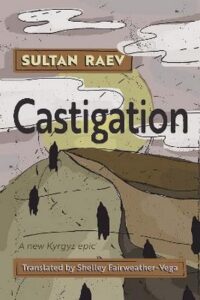“There are only two limitless things in this world: the human soul and its sins.” This grim declaration captures the essence of Sultan Raev’s Castigation, a dense and allegorical novel that draws as much from biblical prophecy as it does from the tragedies of Shakespeare and the myths of antiquity.
The story follows seven recently escaped inmates from an unnamed asylum who embark on a pilgrimage to the “Holy Land”. Known only by their adopted names—Emperor, Genghis Khan, Kozuchak, Alexander the Great, Cleopatra, King Lear, and Thaïs the Athenian—they form a ragged fellowship whose shared histories and fates gradually intertwine. Their journey begins with a proclamation from the self-proclaimed Emperor:
We shall search for the Holy Land, and there in the Holy Land, we shall pray to the Creator for forgiveness, for the absolution of our sins.
What unfolds is a novel that shifts restlessly between times, perspectives, and even planes of reality. Characters slip between the present, the past, and the spirit realm; the reader, like the inmates, is rarely certain whether they are alive or dead, sane or mad. At one point, a character admits she no longer knew “what century’s air she was breathing in”. That disorientation is exactly what the reader feels, producing a sense of claustrophobia that mirrors the inmates’ fractured minds.
Castigation is not easy reading. Its density, obscurity, and unrelenting bleakness demand patience. Yet the rewards are considerable

Raev’s prose, rendered into English from its original Kyrgyz (albeit with reference to an extant Russian translation) is deliberately difficult. The result is a style at once biblical and impenetrable, filled with allegory, classical allusion, and recurring motifs of snakes, old men, stench and apocalypse. Wittgenstein once remarked, “If a lion could speak, we could not understand him.” Reading Castigation sometimes feels like that: doubly obscured by its unfamiliar cultural frame and by the distortions of translation. The oddness of some phrasing only heightens the novel’s strangeness.
Thematically, Castigation circles obsessively around sin, guilt, and punishment. Humans are depicted as base, violent, lustful—little more than animals—yet the novel insists on the reality of the soul, and the responsibility to account for what one does with it. One character warns:
Your soul is eternal, but do not forget that there is also castigation of the soul, and your soul will bear that castigation.
Sexual transgressions, bodily filth, and violent impulses are presented not only as physical realities but also as spiritual burdens that demand reckoning.
The gods in Raev’s vision resemble the merciless powers of authoritarian states: ruthless, incomprehensible, and unrelenting. One might even discern the powerfully resounding echoes of Shakespeare’s King Lear. Gloucester’s lament—“As flies to wanton boys are we to the gods; / They kill us for their sport”—is recalled in the novel’s portrayal of divine cruelty. Lear’s later reflection that the gods “of our pleasant vices make instruments to plague us” seems to find its narrative counterpart in the way Raev’s characters are punished precisely through their own sins and desires.
The translator wisely counsels readers to abandon attempts to fit this tale into any familiar frame.
Readers may also find parallels with Neil Gaiman’s American Gods or David Mitchell’s Cloud Atlas, with their shifting timelines and mythic figures walking among mortals. But Raev’s novel resists categorisation. It is both a spiritual fable and a post-Soviet meditation, heavy with the imagery of decay, divine punishment, and impending apocalypse. It is a world where the dead walk among the living and the living stray into the world of the dead. The novel is most accessible in its historical flashback passages, where the ground feels solid for a moment before giving way again.
The translator wisely counsels readers to abandon attempts to fit this tale into any familiar frame. That is perhaps the only way to endure its shifting landscapes, its disorienting leaps across time and spirit, and its relentless emphasis on punishment.
Castigation is not easy reading. Its density, obscurity, and unrelenting bleakness demand patience. Yet for those who persist—biblical scholars, lovers of myth and tragedy, or readers fascinated by the question of divine justice—the rewards are considerable. This is a novel about eternal burdens: of sin, of the soul, and of the punishments that may await us beyond life.


You must be logged in to post a comment.